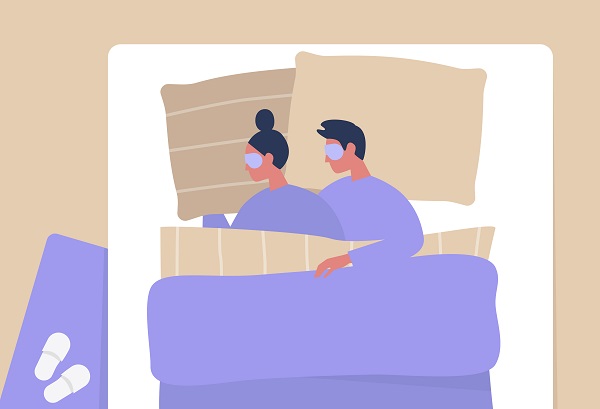Romance, Scent, and Sleep: The Stuff that Dreams Are Made Of

Forget counting sheep. If you really want a good night’s sleep, all you may need is your romantic partner’s favorite T-shirt wrapped around your pillow.
New research accepted for publication in the journal Psychological Science suggests that the scent of a romantic partner can improve your quality of sleep. This is true regardless of whether or not you are consciously aware that the scent is even present.
“A growing body of evidence has shown that close relationships are essential to our health and well being,” said Frances Chen, a researcher at the University of British Columbia, Vancouver, and co-author on the paper. “But far less is known about the role of scent in relationships and social support processes. The current study provides new evidence that the mere scent of a romantic partner improves sleep efficiency.”
Previous research has shown that romantic relationships and close physical contact can provide many physical and mental benefits, including aiding in a good night’s sleep. Other research has shown that scents can have profound and evocative effects on the brain. What has not yet been clearly demonstrated is a direct connection between the two.
Chen and graduate student Marlise Hofer set out to investigate this intersection and to understand how romance, scent, and sleep interact.
Chen and Hofer began their research by asking one member of a heterosexual couple in a long-term (three or more months) relationship to wear a plain cotton T-shirt for 24 hours. During this time, the wearer was to avoid typical scent-producing behaviors, like eating spicy food or doing vigorous exercise. They were also told to avoid perfume, cologne, and antiperspirants. The T-shirt was then hermetically sealed and frozen.
Afterward, the second member of the couple was given two identical shirts, one previously worn by their partner and another that either had been previously worn by a stranger or was scent free.
When a participant used their partner’s worn, scent-bearing T-shirt as a pillowcase, they experienced an average of over nine additional minutes of sleep per night. This equates to more than one hour of additional sleep per week, achieved without spending any more time in bed. The increase was due to participants sleeping more efficiently, meaning they spent less time tossing and turning. Sleep efficiency was measured using a wrist-worn sleep monitor that tracked movement throughout the night.
Participants also gave self-reported measures of sleep quality each morning, which increased on nights they thought they were sleeping with their partner’s scent.
“The effect we observed in our study was similar in magnitude to that reported for melatonin supplements—a commonly used sleep aid. The findings suggest that the scent of our loved ones can affect our health in powerful ways,” noted Hofer.
This research suggests that simple strategies such as taking a partner’s scarf or shirt along when traveling may have measurable effects on our sleep. Future research might determine if the scent of a romantic partner has additional health benefits beyond the domains of stress and sleep.
“These findings reveal that—whether or not we are aware of it—a fascinating world of communication is happening right under our noses!” concludes Hofer.
# # #
Additional research on the science of love and relationships published by the Association for Psychological Science can be found here:
People Who Think Their Partners Are a Perfect Fit Stay Happier—Even if They’re Wrong
Conventional wisdom says that if you idealize the person you marry, the disappointment is just going to be that much worse when you find out they aren’t perfect. But research challenges that assumption. More
People With Happy Spouses May Live Longer
Having a happy spouse can lead to a longer marriage, and now study results show that it’s associated with a longer life, too. More
How Viewing Cute Animals Can Help Rekindle Marital Spark
Using evaluative conditioning, a team of researchers has developed an unconventional intervention for helping a marriage maintain its spark: pictures of puppies and bunnies. More
21 Minutes to Marital Satisfaction
Marital satisfaction generally declines over time, but a brief writing intervention that helps spouses adopt a more objective outlook on marital conflict could help prevent couples from losing that loving feeling. More
# # #
The Association for Psychological Science (APS) is the leading international organization dedicated to advancing scientific psychology across disciplinary and geographic borders. Our members provide a richer understanding of the world through their research, teaching, and application of psychological science. We are passionate about supporting psychological scientists in these pursuits, which we do by sharing cutting-edge research across all areas of the field through our journals and conventions; promoting the integration of scientific perspectives within psychological science and with related disciplines; fostering global connections among our members; engaging the public with our research to promote broader understanding and awareness of psychological science; and advocating for increased support for psychological science in the public policy arena.
Psychological Science, the flagship journal of APS, is the leading peer-reviewed journal publishing empirical research spanning the entire spectrum of the science of psychology. For a copy of this article, “Partner’s Scent Increases Sleep Efficiency,” and access to other research in Psychological Science, contact news@psychologicalscience.org.
For more information about this study, please contact Marlise Hofer at hofer@psych.ubc.ca and Frances Chen at frances.chen@psych.ubc.ca.





APS regularly opens certain online articles for discussion on our website. Effective February 2021, you must be a logged-in APS member to post comments. By posting a comment, you agree to our Community Guidelines and the display of your profile information, including your name and affiliation. Any opinions, findings, conclusions, or recommendations present in article comments are those of the writers and do not necessarily reflect the views of APS or the article’s author. For more information, please see our Community Guidelines.
Please login with your APS account to comment.